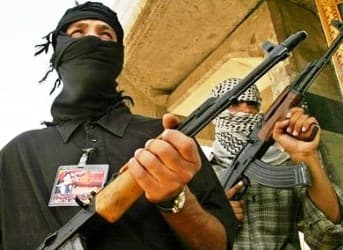When looking at a map of the Middle East and North Africa there is little room for optimism with militant Islamists gaining prominence to varying degrees in countries such as Lebanon, Jordan, Saudi Arabia, Mali and Libya.
In Mali, a former French colony, the French military had to intervene at the start of this year and oust an Islamist-led group that had taken over the country and installed Islamic or sharia law. Large numbers of the fleeing Islamists headed for Libya, where since the overthrow of Colonel Gadhaffi the oil rich country has vacillated between chaos and confusion.
Libya, much to the dismay of many Libyans and the international community has turned into a “Wild, wild west” of the east, albeit sans the saloons and dancing girls; Tunisia’s revolution has faltered and politicians have ended up dead. Egypt, after decades of stability has gone through two tumultuous revolutions in as many years, and the fat lady has yet to sing.
The Syrian civil war that has been raging now for over two years has killed more than 120,000 people, turned about three million into refugees and displaced another two or three million more internally, and it almost served as a trigger for World War III pitting Russians and Americans in a dangerous face off over Bashar Assad’s arsenal of chemical weapons.
Then there is the instability in Bahrain where the Shiites continue to demand to have a say in the political voice in the tiny island nation.
Yemen remains unstable with al Qaida carrying out attacks against the government and any foreigner brave enough, or mad enough to venture into this county where the central authority has no control of anything happening outside the city limits.
Related article: Engaging Iran in Syria
Iraq and Afghanistan remain unstable vacillating between pro- and anti-Islamists, pro- and anti-Americans and pro- and anti-government forces.
But among all these dismaying facts there is one ray of hope in the region emanating in the far western corner of the Middle East-North Africa region: Morocco.
That is not to say that the country is not without its fair share of problems; it certainly has its full load and then some, when looking at the rate of unemployment, the idle youth (usually a source or potential trouble in an Arab country), its headaches with its powerful neighbor to the East, Algeria.
But Morocco is at peace with itself with a young monarch, King Mohammad VI, who has been busy scrubbing away the sins of his father, King Hassan II, who jailed tens of thousands of people in the country because he disagreed with their way of thinking. The new king has preempted much of what is playing itself out in other countries by taking affirmative action on topics that concerns the people of Morocco instead of waiting for the people to take to the streets in protests. Items such as the family law and giving women an equal footing and their place in government.
In releasing and pardoning tens of thousands of political prisoners King Mohammed VI was able to admit that these people had been wrongly jailed. In an Arab country this is virtually unheard of and many leaders in the Arab world would consider this an embarrassment. But not so with Morocco’s newest king, who not only released many of the people his father had jailed. Mohammed VI not only released thousands of prisoners but made sure that some were properly employed.
Related article: Egypt for Sale
Driss El Yazami is one of them. He is a former leftist who spent time as a guest of Hassan II in prison. Today El Yazani is the president of a human rights group composed of 44 members and 13 commissions. The existence of this group has been mandated by the constitution which the young monarch requested be written and subsequently adopted by the parliament. The National Council of Human Rights operates on a yearly budget of $5 million, and funded by the prime minister’s office but, as per the constitution, the PM’s office has no authority over the group or its president.
El Yazami, who opposed the monarchy under Hassan II, praises the progressive King Mohammed VI saying what many Moroccans today admit, especially when looking at the chaos and mayhem surrounding this country, a haven of political tranquility, yet not without some turbulence among the various political parties vying for power through a democratic system of governance.
“If it were not for the monarchy we would have anarchy,” said El Yazami.
Claude Salhani is editor of ArabSpringNow.com and a specialist in the Middle East, terrorism and politicized Islam. He tweets @claudesalhani. His latest book, Inauguration Day, is available exclusively on line at amazon.com.
By. Claude Salhani


















